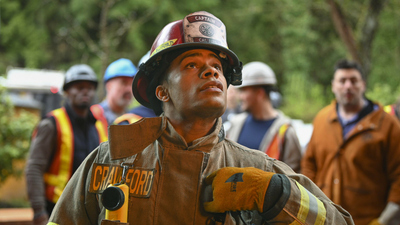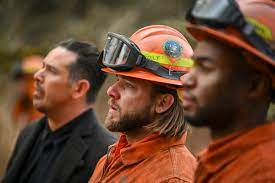
From Prison Walls to Fire Lines
In a television landscape crowded with crime procedurals and firefighter dramas, Fire Country sets itself apart by combining both — and adding an unexpected twist. The series doesn’t just show firefighters rushing into danger. It shows incarcerated men earning redemption by running into those fires themselves.
Set in the fictional town of Edgewater, Fire Country follows Bode Donovan (played by Max Thieriot), a convict serving time through California’s inmate firefighter program. But beyond the action, the show dives deep into themes of forgiveness, transformation, and the high cost of reclaiming one’s future.
This isn’t just a series about putting out fires. It’s about reigniting hope — especially for those whom society has written off.
Bode Donovan: Flawed, Fierce, and Fighting for More
At the heart of Fire Country lies Bode, a character whose complexity drives the entire show. Once a star athlete and hometown favorite, his fall from grace due to addiction, crime, and bad decisions is painful — and all too relatable.
But Bode isn’t a villain. He’s not a victim either. He’s a man on a mission: to prove he’s more than the worst thing he’s ever done.
His work as an inmate firefighter isn’t glamorous. It’s dangerous, dirty, and often thankless. Yet for Bode, every call is a chance to earn trust, especially from his estranged parents — Vince, a battalion chief, and Sharon, the fire chief of Three Rock Camp.
Bode’s arc shows that redemption is a daily decision, not a dramatic event. It’s not about being perfect. It’s about being better today than you were yesterday — and risking everything for that chance.
The Inmate Firefighter Program: Real Life Reflected

The series draws inspiration from California’s real-life Conservation Camp Program, which has employed incarcerated people to fight wildfires since the 1940s. These men receive rigorous training, are deployed alongside professional firefighters, and risk their lives for just a few dollars a day.
Critics of the system call it exploitative. Supporters argue it gives inmates purpose and skills they can use post-release. Fire Country doesn’t shy away from this debate. It presents the nuance, the danger, and the hope inherent in such a system.
We see inmates bonding over trauma, grappling with guilt, and learning discipline not through punishment — but through purpose.
It’s a rare portrayal of rehabilitation as empowerment, not just restriction.
Second Chances and Society’s Reluctance
One of the show’s most powerful undercurrents is how hard it is to be given a second chance — especially when everyone around you remembers your worst day.
Even when Bode saves lives, risks his own, or follows every rule, there are always skeptics: townspeople, fellow firefighters, even family members. The stigma of incarceration clings to him like smoke.
This mirrors the real-life struggle of millions of formerly incarcerated people who face barriers to employment, housing, and community acceptance long after their release.
Fire Country doesn’t pretend these obstacles disappear. Instead, it explores how trust must be rebuilt slowly, with sweat, sacrifice, and sincerity.
A Broader Message for a Broken System
By placing its main character in a prison-to-fireline storyline, Fire Country offers commentary on the U.S. criminal justice system, mass incarceration, and the lack of genuine rehabilitation.
It asks hard questions: Who deserves a second chance? Can people really change? And if they can — will we let them?
Bode’s story suggests that the answer is yes — but only if we as a society are willing to believe in something more than punishment: redemption through service.
Conclusion: Burning the Past to Build a Future
Fire Country turns a simple premise — inmates fighting fires — into a deeply emotional narrative about justice, guilt, and healing. It challenges viewers to see beyond the orange jumpsuit, to recognize humanity in the unlikeliest places.
For Bode and others like him, the fire isn’t just a danger. It’s a symbol — of cleansing, of pain, and ultimately, of hope.
And in that heat, we see something rare on network television: a bold new vision for what redemption can look like.
